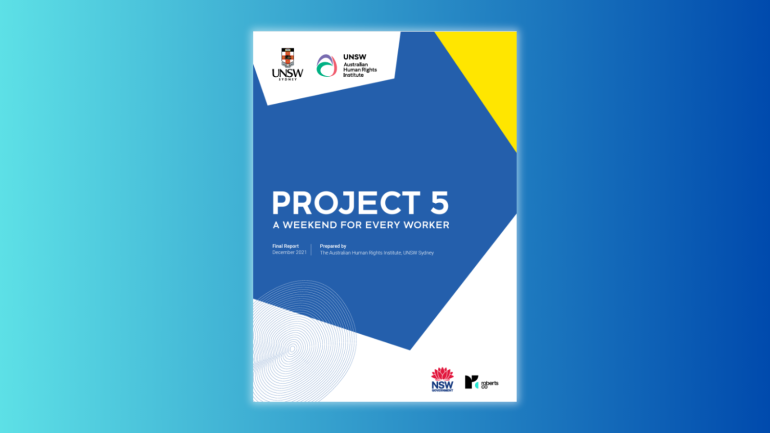A two-year research study by the Australian Human Rights Institute at UNSW Sydney has found a positive link between the five-day work week and improvements in construction workers’ wellbeing.
Project 5: A weekend for every worker examined whether changing construction workers’ schedules to include a full weekend would make a positive difference to their wellbeing in a sector characterised by long and unpredictable working hours, which have an impact on physical and mental health.
The report's release comes just a few days after World Day for Safety and Health at Work, which this year encouraged workplaces to act together to build a positive safety and health culture.
Research Lead for Project 5 Dr Natalie Galea said that despite the construction industry being a powerhouse of the nation’s economy as Australia’s third largest employer, its conditions are not kind to workers.
“Research tells us that construction work practices contribute to a range of wellbeing issues for workers including heightened stress, burnout, poor mental health, and anxiety," Dr Galea said.
"Compared to the general population, construction workers have higher rates of physical injury, serious mental health disorders and suicide compared to other occupations and the general public.
“We also know from research that construction’s work practices are a barrier to women’s participation in the Australia’s most male dominated sector.
As part of the study, workers were recruited to participate at three Sydney construction sites operated by construction firm Roberts Co. Two of the sites implemented a five-day work week. These were construction sites for hospital redevelopments, where the client was the state government service Health Infrastructure NSW. The third site was a control site where the usual six-day work week operated.
Most workers (75.4%) preferred a five-day work week over either a six- or seven-day working week, with 50% reporting a great difference to their work-life balance and 28% reporting some difference to their work-life balance. Workers reported an increase in all areas of job satisfaction, including work hours, pay, job security, family and work relationships during Project 5 compared to their previous job.
The next of kin who were interviewed described the five-day work week as life changing. With their partners more available and active in family life, they felt their own wellbeing had also improved.
Report recommendations include:
- Government procurement processes should include a rigorous assessment of work schedules proposed in tenders, to ensure they can be delivered without adverse impacts on the health and wellbeing of workers.
- The federal government should consider revising statutory limits on working hours in Australia in order to ensure the safety and wellbeing of workers in high-risk sectors.
- Clients (including government) should seek early collaboration with contractors in the tendering process to ‘stress test’ projects, making sure they can be reasonably delivered within timeframes without adverse worker impacts.
- The construction sector should reduce and regulate working hours to improve the wellbeing of workers and their families. This would allow workers to plan and share in childcare, and improve women’s participation in construction site roles.
Project 5: A weekend for every worker was commissioned by Roberts Co, and Health Infrastructure NSW. An executive summary and full report can be read and downloaded here.
MEDIA:
Drew Sheldrick
Australian Human Rights Institute
e: d.sheldrick@unsw.edu.au
